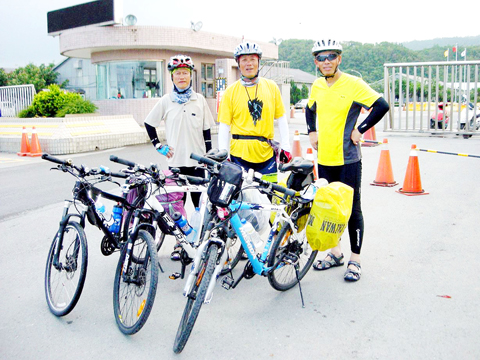Most radiation that humans come into contact with exists naturally in the environment and is harmless to human health, the Atomic Energy Council (AEC) said yesterday, adding that people should not be overly concerned about radiation hazards in their daily lives.
Last month, three AEC employees spent 10 days traveling around the country on their bikes. Five flat tires, two falls into gutters and some 300 or more radiation checks later, the trio returned to Taipei with data showing that radiation levels nationwide are within safety levels, AEC Radiation Monitoring Center director Huang Ching-chung (黃景鐘) said.
“Two-thirds of the radiation people experience in life exists in the environment naturally, while another third comes from medical treatments such as X-rays or MRI scans,” Huang said.

PHOTO: CNA
Radiation coming from nuclear plants or other nuclear devices combined contributes to less than 1 percent of total radiation, he added.
What is also important to know is that radiation — measured in alpha, beta or gamma rays — produces the same effect on human bodies despite its source, Huang said.
For example, cosmic gamma rays would have the same effect on the body as gamma rays produced by a nuclear plant, he said.
In terms of the radiation levels measured by the three bikers, “the highest gamma ray dose was 0.050 microsieverts per hour (μSv/h), measured on the Northern Cross-Island Highway (北橫公路), while the lowest was 0.023 μSv/h around Hualien,” Huang said.
“However, even if one looks at the ‘double’ amount, in reality they are both far below the 0.2 μSv/h safety level published by the AEC, and the differences should be regarded as insignificant and ascribed to natural variations,” he said.
The same conclusion also applies to areas to which the bikers did not trek, such as high mountains, where radiation levels are naturally stronger.
“Three major sources contribute to natural ionizing radiation in the environment — cosmic rays, gamma rays from the earth and sources in the atmosphere including radon gas,” Huang said.
Cosmic rays are stronger in higher latitudes, thereby strongest at the North Pole, Huang said, adding that high altitude regions atop mountains like Alishan are also affected more strongly by the rays.
But as the nation as a whole has a low level of radiation, the place with the “highest radiation” is not scientifically meaningful, and the public should not panic and avoid hiking even if the radiation level is above 0.2μSv/h, Huang said,
Citing the world’s four areas with the strongest levels of natural background radiation — Brazil’s Guarapari, China’s Yangjiang, India’s Kerala and Iran’s Ramsar — Huang said that while Guarapari is a prime tourist destination drawing crowds of visitors with its natural mud baths, major studies conducted in Yangjiang have found that nearby residents suffer from no long-term health maladies because of the radiation.
“The dose of natural background radiation in those places is hundreds of times higher than the 0.2 μSv/h level,” Huang said.

South Korean K-pop girl group Blackpink are to make Kaohsiung the first stop on their Asia tour when they perform at Kaohsiung National Stadium on Oct. 18 and 19, the event organizer said yesterday. The upcoming performances will also make Blackpink the first girl group ever to perform twice at the stadium. It will be the group’s third visit to Taiwan to stage a concert. The last time Blackpink held a concert in the city was in March 2023. Their first concert in Taiwan was on March 3, 2019, at NTSU Arena (Linkou Arena). The group’s 2022-2023 “Born Pink” tour set a

CPBL players, cheerleaders and officials pose at a news conference in Taipei yesterday announcing the upcoming All-Star Game. This year’s CPBL All-Star Weekend is to be held at the Taipei Dome on July 19 and 20.

The Taiwan High Court yesterday upheld a lower court’s decision that ruled in favor of former president Tsai Ing-wen (蔡英文) regarding the legitimacy of her doctoral degree. The issue surrounding Tsai’s academic credentials was raised by former political talk show host Dennis Peng (彭文正) in a Facebook post in June 2019, when Tsai was seeking re-election. Peng has repeatedly accused Tsai of never completing her doctoral dissertation to get a doctoral degree in law from the London School of Economics and Political Science (LSE) in 1984. He subsequently filed a declaratory action charging that

The Hualien Branch of the High Court today sentenced the main suspect in the 2021 fatal derailment of the Taroko Express to 12 years and six months in jail in the second trial of the suspect for his role in Taiwan’s deadliest train crash. Lee Yi-hsiang (李義祥), the driver of a crane truck that fell onto the tracks and which the the Taiwan Railways Administration's (TRA) train crashed into in an accident that killed 49 people and injured 200, was sentenced to seven years and 10 months in the first trial by the Hualien District Court in 2022. Hoa Van Hao, a